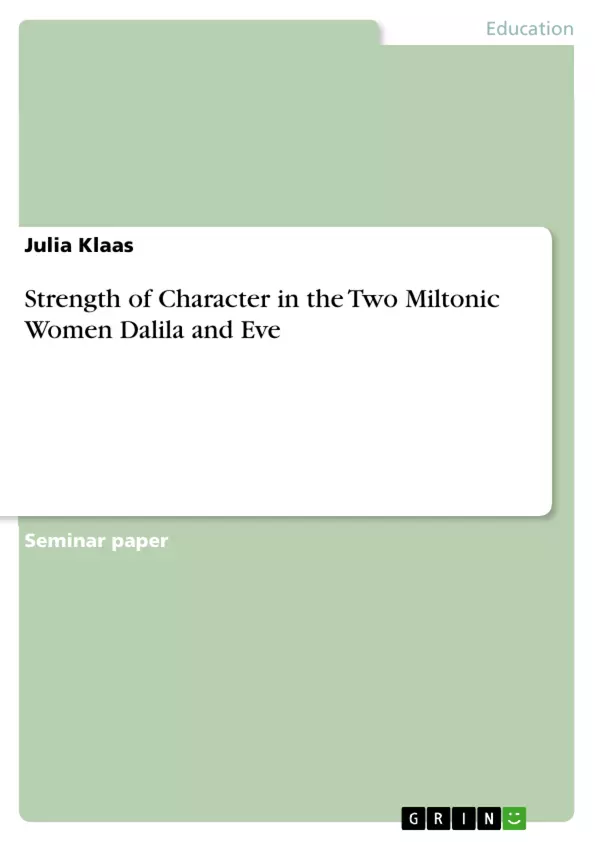I would like to explore and mainly compare the characters of Eve and Dalila with respect to the strength that they portray within the disputes with their respective husbands. There are, however, some other aspects that come into play when looking at these scenes in "Paradise Lost" and "Samson Agonistes".
I will start with a formal analysis of the poetic form in order to demonstrate that when looking at turn-taking and metric organization, there is already an indication of how the content in Milton's most famous poem and his closet drama is organized and how these two female characters are displayed to the audience.
Then I will delve into a contrastive analysis of said context, and I will especially be focusing on how Eve's and Dalila's arguments are influenced by Adam and Samson, and how this has an impact on the outcome of their conversations, and, in the end, their marriages. From this, I will extract two aspects that require a closer look: the relationship between power and female liberty, and that of guilt and forgiveness.
Table of Contents
- I. Introduction
- II. Strength, Power and Guilt in Dalila and Eve
- Conversational and Metric Organization
- Masculine Influence on Eve's and Dalila's Reactions
- Power and Female Liberty
- Guilt and Forgiveness
- III. Conclusion
- IV. Works Cited
Objectives and Key Themes
This paper explores the characters of Eve and Dalila in Milton’s works, comparing their portrayals and analyzing their interactions with their respective husbands. The aim is to understand how these women deviate from traditional expectations of female behavior in Milton’s time and how their actions are shaped by the masculine influence they encounter. The focus is on the conversations between Eve and Adam, and Dalila and Samson, highlighting the development of these characters through their interactions.
- The portrayal of women and their defiance of traditional gender roles in Milton’s work
- The influence of masculine power on the actions and reactions of Eve and Dalila
- The contrasting consequences of transgression and the ability to seek forgiveness in the context of the two relationships
- The impact of conversational dynamics and poetic structures on the representation of female characters
- The exploration of guilt and its role in shaping the outcomes of the relationships between Eve and Adam, and Dalila and Samson
Chapter Summaries
The introduction sets the stage by examining the scholarly debate surrounding the characters of Eve and Dalila, highlighting their divergence from traditional female roles. It emphasizes the significance of analyzing their conversations with Adam and Samson, particularly in the context of their transgressions and attempts at reconciliation.
Chapter II delves into the core of the analysis, exploring the interplay of strength, power, and guilt in the characters of Eve and Dalila. The chapter examines the conversational dynamics and poetic structures that shape their portrayals, considering the impact of masculine influence on their reactions. It further analyzes the concepts of female liberty and the pursuit of forgiveness within the context of their respective relationships.
Keywords
The paper focuses on the characters of Eve and Dalila, their portrayal in Milton’s works, and their interactions with Adam and Samson. Key themes include female agency, masculine influence, transgression, forgiveness, and the impact of conversational dynamics and poetic structures on the representation of female characters.
Frequently Asked Questions
What is the main focus of the comparison between Eve and Dalila?
The paper compares the strength and power these two female characters portray during disputes with their husbands, Adam and Samson, in Milton's works.
How does the poetic form indicate character traits?
Through formal analysis of turn-taking and metric organization, the paper shows how Milton uses structure to display female agency or submission.
What is the relationship between power and female liberty in these works?
The analysis explores how Eve and Dalila navigate their desire for liberty within relationships dominated by masculine influence and societal expectations.
How do guilt and forgiveness play a role in their marriages?
The paper examines how each woman handles her transgression and the different ways Adam and Samson respond to their wives' pleas for forgiveness.
Do Eve and Dalila defy traditional gender roles?
Yes, the study argues that both characters deviate from traditional 17th-century expectations of female behavior through their complex arguments and actions.
- Quote paper
- Julia Klaas (Author), 2012, Strength of Character in the Two Miltonic Women Dalila and Eve, Munich, GRIN Verlag, https://www.hausarbeiten.de/document/492529


